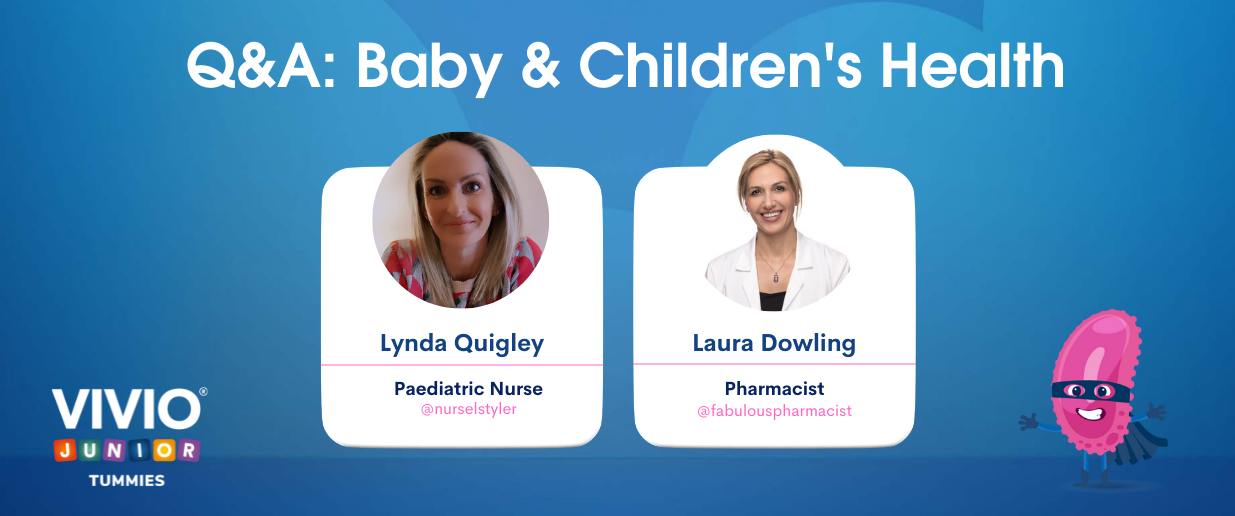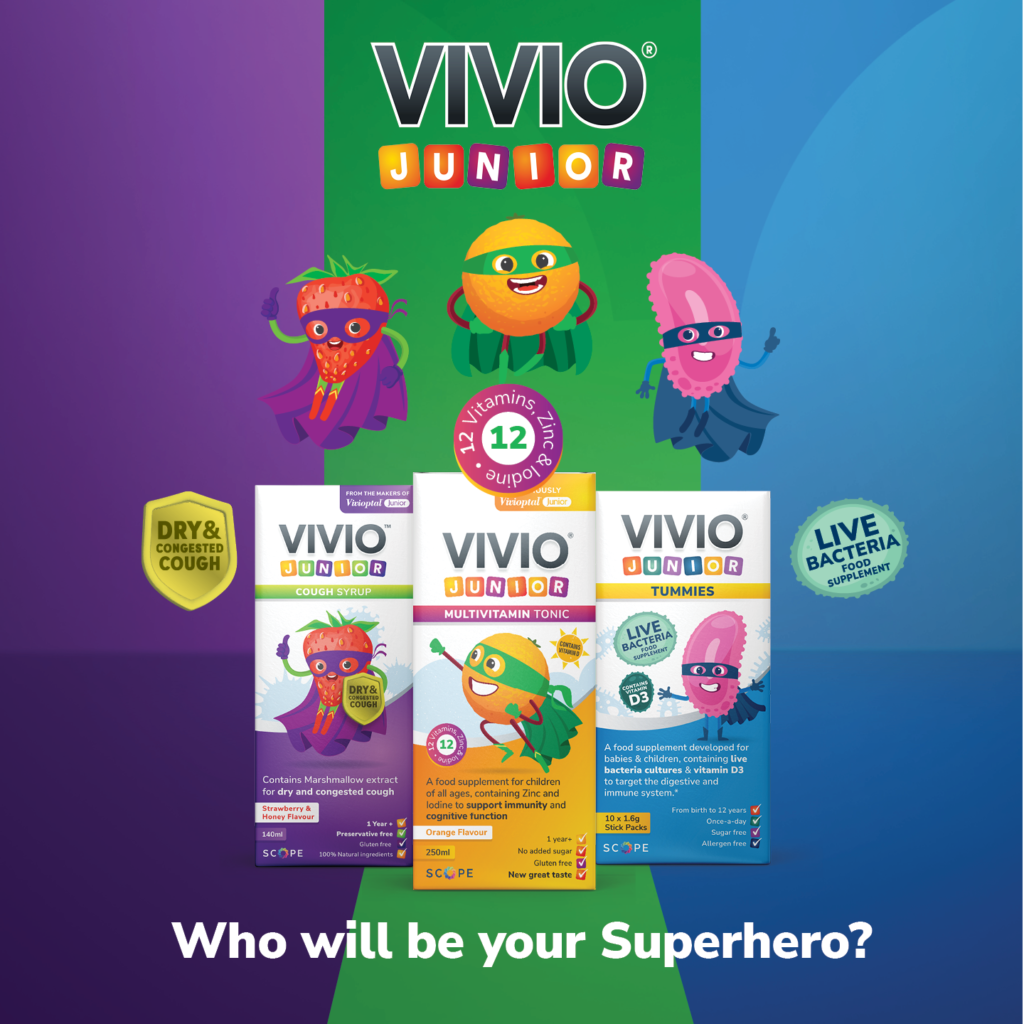
Top tips provided by clinical nutritionist Eva Hill Hamilton
Coughs, sniffles and sneezes are those all too familiar sounds that remind us that colder weather is on the way. For little ones, it can mean days off nursery or school and missed activities, so helping your child be at their healthy best is understandably a top priority for parents.
New research[i] by VIVIO® Junior reveals that 1 in 4 mums and dads believe their child’s diet has an impact on how susceptible they are to catching coughs and sniffles, with over 80% worrying their child doesn’t get all of the nutrients they need from their diet alone.
With over 70% of our immune cells living in our gut[ii], ensuring your little one eats a rainbow of fruit and vegetables is a great way to ‘feed’ the good bacteria living in your child’s gut and fend off those bugs and germs.
However, it’s no easy task for parents, and research shows that many mums and dads feel frustrated when their child won’t eat the foods they’ve cooked, and nine in 10 worry about their child’s overall health due to them being picky.
Luckily, VIVIO® Junior’s Eva Hill Hamilton is here with her top tips for looking after your little ones health this winter and ensuring fuss-free mealtimes:

- Be curious: There’s often a reason why a child becomes fussy with foods, for instance they might see a grown-up or child at school refusing foods and start to do the same, or if it’s accompanied with poor appetite, then it could be digestive problems which can result in nutrient deficiencies. Zinc and B vitamins are vital for good digestive health, so ensuring your little one gets plenty of foods rich in wholegrains, nuts, seeds, spinach and fish as part of a varied diet can make a big difference.
- Keep it real: It sounds silly but the foods we feed our children should resemble ‘real food’ as much as possible, as opposed to pre-packaged, processed foods that are less likely to contain the vitamins and minerals a child needs to stay healthy. Encourage your child to help you prepare fruits and veggies to spark their interest and build their confidence when it comes to new foods or foods they tend to refuse. Whizzing up chickpeas to make your own hummus for dipping veggie sticks can take minutes, or mashing-up your child’s favourite fruits with Greek yoghurt to make your own yummy yoghurt are both great ways to cram in healthy fruits and vegetables.

- Fuel their health and take care of coughs: Multivitamins are beneficial all year round, especially for youngsters who are picky when it comes to fresh foods and vegetables. VIVIO® Junior Multivitamin is perfect for children from 12 months onwards, just one dose a day covers a wide range of well absorbable nutrients and contributes to their wellbeing. If your child is struck down with a winter cough, look out for natural remedies that soothe the symptoms without suppressing it, like VIVIO® Junior Cough Syrup, as coughs are a natural defense mechanism to clear and protect the body.
- Don’t forget protein: We tend to focus a lot on fruits and vegetables when it comes to our children’s wellbeing, and forget healthy proteins like cubes of chicken, beans and lentils, and seeds and nuts which are packed with immune-boosting nutrients like omega 3s, iron, vitamin D and selenium. Ensuring your child has a serving of protein with every meal and snack is key to supporting healthy growth and development.
- Keep calm and carry on! Family life can be hectic at times, so it’s understandable to want to make the foods you know your child will eat at mealtimes, however persisting and not getting too worried when your little one refuses food is key to helping them overcome picky eating. Adding pressure when it comes to trying foods can usually backfire, so avoid saying things like ‘just one more bite’, or ‘eat up it’s getting cold’. Instead, if your little one refuses food, calmly take it away and offer it later when they get hungry.

- Viva variety: When it comes to our children’s gut flora (the tiny microbes responsible for supporting our gut health), ensuring we don’t give the same foods over and over is key to helping us digest the foods we eat and increase the variety of flora in our gut. Pasta is a popular choice for lots of little ones, so offering different types such as pasta made from beans and lentils, or spelt pasta which contains more nutrients, are both great ways to include more diverse foods in our children’s diet.
- Offer plenty of water (just not with meals): Water is key to helping your child stay hydrated, but giving them lots of liquids at meal times can trick their tummy in to thinking it’s full so it takes longer for your little one to eat and can cause them to lose their appetite. Offer a drink of water with a splash of lemon or orange juice in 30 minutes before their meal to help get their digestion going instead. This also supports better digestion as their digestive enzymes aren’t being diluted by lots of liquids.
- Support their immunity with a protein-packed smoothie! Get your little one involved in blending-up this delicious smoothie crammed with gut healthy ingredients, essential fats and Vitamin C. Recipe serves 2 children:

Recipe Ingredients
– 1 slice of fresh pineapple, peeled and chopped (include the hard middle part!)
– ½ ripe avocado (try Strong Roots frozen ones from supermarkets)
– 200ml coconut milk (from a carton, not tinned)
– 1 tsp vanilla extract
– 2 tbsp plain unflavoured whey protein powder
– A live bacteria supplement
*Always speak to your child’s GP if you are worried about your child’s health, nutrition or fussy eating.
[i] Research conducted on 1,000 parents by OnePoll on behalf of VIVIO® Junior in September 2022
[ii] https://pubmed.ncbi.nlm.nih.gov/33803407/










